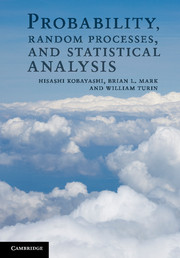 Probability, Random Processes, and Statistical Analysis
Probability, Random Processes, and Statistical Analysis Published online by Cambridge University Press: 05 June 2012
Why study probability, random processes, and statistical analysis?
Many problems we face in daily life involve some degree of uncertainty and we need to use probabilistic reasoning in order to make a sound decision, be it an investment, medical, or social problem. In many cases “probability” may represent our personal judgment about how likely a particular event (e.g., price movement of a stock we own; positive or negative effect of some medicine we may choose to take when we are ill) is to occur. Probability attached to a given event is generally not based on any precise computation but is often a reasonable assessment based on our knowledge or experience. Such probability may be aptly called subjective or qualitative probability, and may not be scientifically estimated, unless the same event happens repeatedly.
The other type of probability we deal with is what we may call objective or quantitative probability, which can be estimated objectively based on empirical evidence from observable events. This philosophical question concerning subjective versus objective probability has been pondered by many probabilists and statisticians, as we will briefly discuss in Section 1.2. Philosophical discussion on subjective probability still continues today as a fascinating topic, as is found in arguments between two schools of statistics, i.e., frequentist statistics and Bayesian statistics, which will be discussed at the end of this chapter.
In this book we will discuss probability based on the modern probability theory established by Kolmogorov in the early twentieth century.
To save this book to your Kindle, first ensure [email protected] is added to your Approved Personal Document E-mail List under your Personal Document Settings on the Manage Your Content and Devices page of your Amazon account. Then enter the ‘name’ part of your Kindle email address below. Find out more about saving to your Kindle.
Note you can select to save to either the @free.kindle.com or @kindle.com variations. ‘@free.kindle.com’ emails are free but can only be saved to your device when it is connected to wi-fi. ‘@kindle.com’ emails can be delivered even when you are not connected to wi-fi, but note that service fees apply.
Find out more about the Kindle Personal Document Service.
To save content items to your account, please confirm that you agree to abide by our usage policies. If this is the first time you use this feature, you will be asked to authorise Cambridge Core to connect with your account. Find out more about saving content to Dropbox.
To save content items to your account, please confirm that you agree to abide by our usage policies. If this is the first time you use this feature, you will be asked to authorise Cambridge Core to connect with your account. Find out more about saving content to Google Drive.